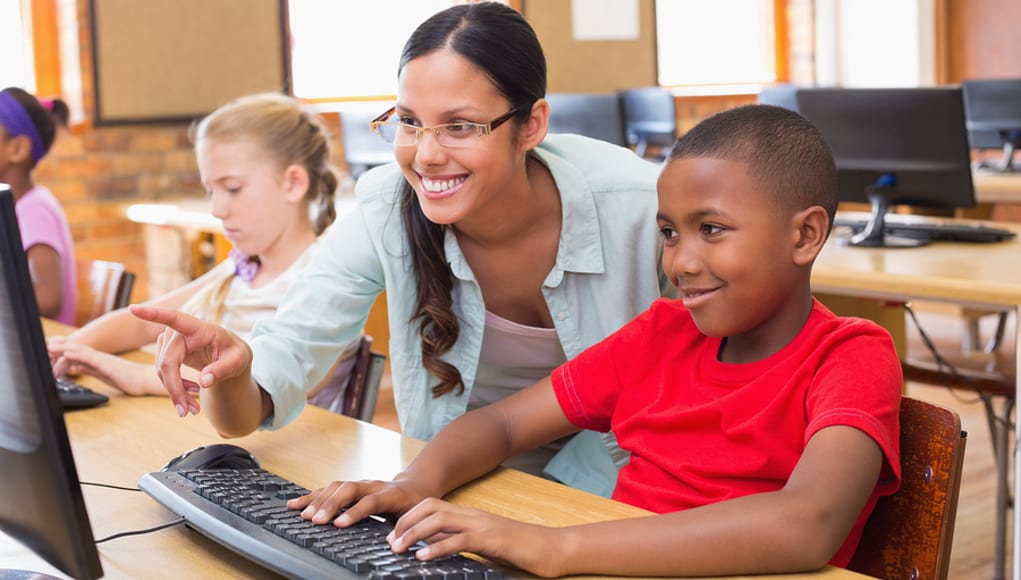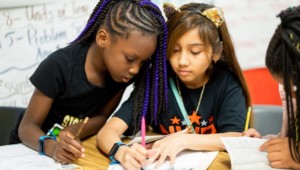Takeaways from the 2017 Blended and Personalized Learning Conference

At this year’s Blended and Personalized Learning Conference (BPLC), the Highlander Institute, The Learning Accelerator and the Christensen Institute brought together, in a side meeting of the main event, more than 100 education leaders from across key focus areas such as competency-based learning, school redesign and strategy-scaling. These seasoned implementers of strategies for refining and enriching innovative ways to practice student-centered teaching and learning at the district, school and classroom level came together for a full day of rich discussion. Today, BPLC released a report highlighting the seven key takeaways from that discussion. We recommend checking out the full report, but some teasers included:
1) Modify models to expand relationships and collaboration.
“Relationships extend beyond just teacher-student connections—they include relationships among students themselves, and among teachers and administrative teams.” – Page 4
2) Go slow to go fast when implementing competency-based models.
“Overwhelmingly, those schools that had embarked on a competency-based journey emphasized the importance of community buy-in.” – Page 4
“Other leaders likewise recommended solidifying a strong school culture before attempting to radically change long-held processes of the school, such as grading and schedules.” – Page 4
We found some of the paper’s insights on competency-based learning to be particularly relevant and timely (and in line with much of what we discussed in Policy, Pilots and the Path to Competency-Based Education).
3) Make students agents of their learning.
“[Student agency] can include a wide range of dimensions like choice, self-awareness, self-management, social relationships, responsible decisions, time management, organization, and self-regulation on the way to a long-term, personalized goal. Although blended and personalized models may begin to customize better to students’ needs and strengths, not all such models provide students with voice and choice.” – Page 5
4) Expand the conversation about cultural relevance.
“One teacher from District of Columbia Public Schools said that educators should help infuse cultural relevance throughout learning experiences both inside and outside the classroom. ‘It shouldn’t just be a class or a book,’ she said. ‘Ask students, where do you see your identity represented and supported in your school?’” – Page 6
Cultural relevance and responsivity are becoming more and more important aspects of today’s classrooms, and this trend will only continue with increasing globalization.
5) Frame tech as one tool in the toolbox.
“When it comes to expanding blended-learning efforts, though, another mindset shift has to happen: technology is an essential tool for going blended, but strong pedagogy will always be the backbone of a great blended program.“ – Page 7
6) Reinvent PD for the 21st century.
“Participants dove in on the strategies they’ve taken and observed to enhance and incentivize continual professional growth. For example, Aylon Samouha of Transcend Education noted that teachers with a high level of self-awareness tend to be more effective. With this in mind, he asked, ‘How can we better prepare teachers to better measure themselves?’” – Page 7
Another one of our staff favorites out of these takeaways was the importance of relevant, engaging, and personalized teacher PD. This was one of the key takeaways in our recent podcast series on pilot program design for schools and districts.
7) Seek out smart approaches to scale.
“When encouraging the scaling of models, there is a clear tension between being flexible and personalized enough in response to varied local conditions, and ensuring the fidelity of certain model components. Andrew Frishman of Big Picture Learning suggested that scaling is best done with a generous frame of mind. “We think of it as spread instead of scale,” Frishman said. ‘Our goal is not to be imperial nor colonial but rather to leverage existing local assets to spread our proven approach and practices.’” – Page 9
For eight pages of additional insights from experts such as Jin-Soo Huh, Erin Mote, Robyn Bagley, Michael Nagler and many more, we suggest checking out the full report.
Interested in attending the 2018 Blended and Personalized Conference April 5-7th in Providence, RI? Be ssure to the visit the conference registration or vendor registration page.
And, if after reading, you find that you’re still looking for more resources on school and district improvement, consider taking a look at the following:
- Designing Pilot Programs for Schools and Districts
- Leading Change: How School District IT Departments are Evolving to Become Technology Evangelists
- Silicon Schools Reflects on Five Years of Personalized Learning
Stay in-the-know with all things EdTech and innovations in learning by signing up to receive the weekly Smart Update.




0 Comments
Leave a Comment
Your email address will not be published. All fields are required.